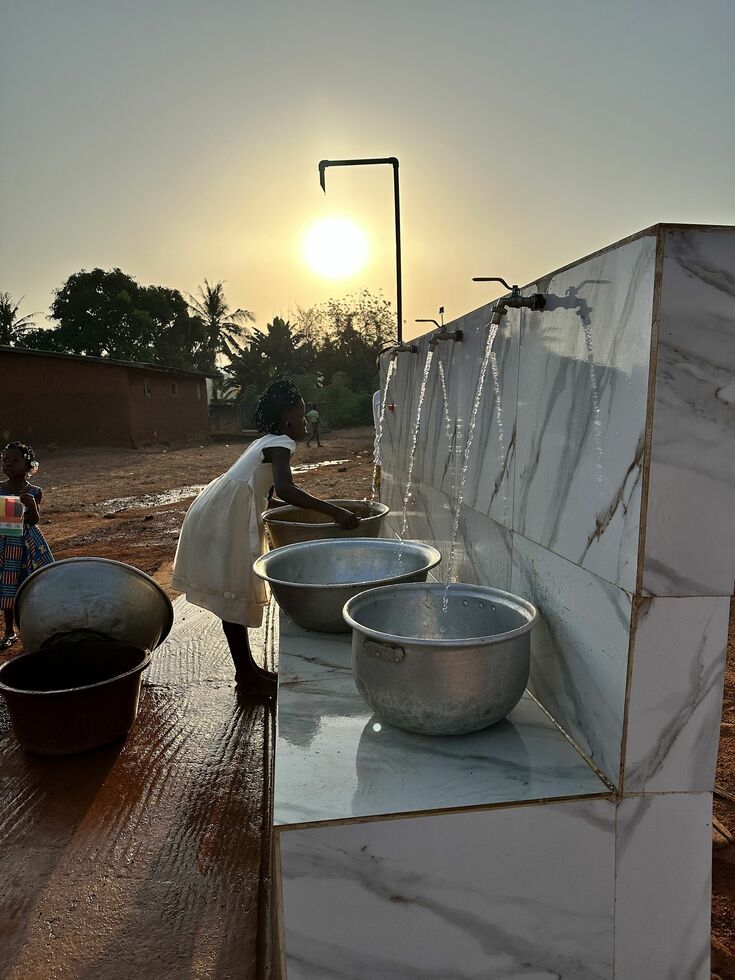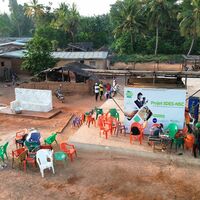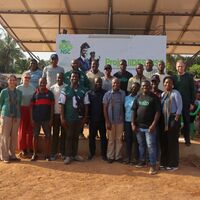The international project "Industry-Integrated Dual Engineering Studies in a North-South Collaboration" (IIDES-NSC) between the SWK E² - Institute of Energy Technology and Energy Management at Hochschule Niederrhein and the Université Nangui Abrogoua (UNA) in Abidjan, the capital of Côte d'Ivoire, has been successfully completed after around four years.
The village of Legroskro now has a self-sufficient system that uses a pump to bring drinking and process water up from a depth of around 80 meters. The pump receives the necessary energy from a PV system, which also produces enough electricity to supply other practical items such as a central cell phone charging point and a refrigerator.
This system was built by ten students from Côte d'Ivoire, who were guests at The Hochschule Niederrhein in Krefeld between August 2023 and January 2024, where they were able to deepen their knowledge. Together with colleagues from the SWK E² - Institute of Energy Technology and Energy Management at The Hochschule Niederrhein, a prototype was developed, the planning of which began in Krefeld and was subsequently installed on the university campus in Abidjan.
The second prototype was built in Legroskro, an eight-hour drive from Abidjan. The almost 500 inhabitants celebrated the inauguration of the plant with a big party, which was also attended by a delegation from The Hochschule Niederrhein.
Two days later, the ten Ivorian students at UNA received their master's degree certificates. They are the first graduates of the Master's degree programme in Water and Energy Technology, which was introduced to UNA as part of the project. The program aims to train a new generation of engineers who can tackle the complex challenges of sustainable development. The drinking water situation in the West African country is considered particularly difficult; a consequence of illegal gold mining, which repeatedly pollutes parts of the groundwater.
The graduates now want to work together to ensure a sustainable improvement in the situation. To this end, they have founded their own start-up. It is called "Schlüssel" (key) and its German name is a reminder of the successful cooperation between a German and an Ivorian university. The aim of the start-up is to build more drinking and service water systems in their home country.
UNA President Professor Véronique Yoboué thanked the project partners: "This project testifies to the importance of a dual approach to engineering education, combining academic excellence and practical experience in this field," she said at the ceremony.
Professor Dr.-Ing. Arne Graßmann, who led the project on behalf of The Hochschule Niederrhein, is very pleased with the result: "We set out to create a new Master's degree programme in order to prove, together with the students, that universities in Côte d'Ivoire can impart both theoretical knowledge and practical engineering skills. The prototypes developed and built by the students are impressive proof that applied research is possible and that companies can involve local universities as development partners."
The project was sponsored by the German Academic Exchange Service (DAAD) and the Federal Ministry for Economic Cooperation and Development (BMZ) with around 720,000 euros.
The Hochschule Niederrhein, the Association of Cameroonian Engineers and Computer Scientists (VKII), the industrial partners WILO SE and euregio-solarzentrum GmbH and the company Toukam Consulting all contributed to the success of this project.




















